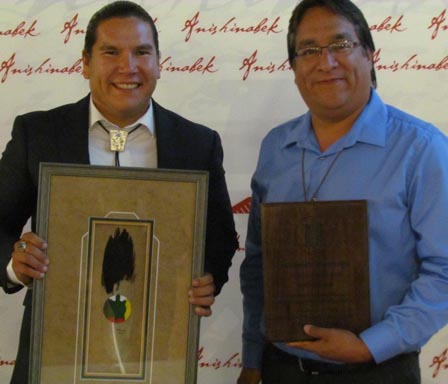Debwewin Citations awarded to Anishinabek storytellers

By Marci Becking
SUDBURY – CBC journalist Waubgeshig Rice and Aamjiwnaang freelancer Greg Plain were presented with Debwewin Citations for excellence in First Nations storytelling on Aug. 20 at the Anishinabek Evening of Excellence.
Waub Rice accepted the 2014 Debwewin Citation honour from Grand Council Chief Patrick Madahbee and thanked his past experience with the Anishinabek News.
“A student trip to Germany turned into my first stories for the Anishinabek News,” said Rice who noted that former Anishinabek News editor Dave Dale encouraged him to write.
Rice, a citizen of Wasauksing First Nation near Parry Sound is now a videojournalist in the public broadcaster’s Ottawa newsroom. He produced “Capital NDNs”, an hour-long television documentary about contemporary Aboriginal life in Ottawa, and his video contributions to CBC’s “8th Fire Digital Project” include “Mixed Blood” and “Sacraments and the Smudge”.
“It’s important for First Nations people to tell our stories,” said Rice. “I am very honoured to be accepting this award from my nation – my people.”
Grand Council Chief Madahbee, on behalf of the 39 member Anishinabek First Nations, said that all political leaders recognize the importance of communications.
“The Anishinabek are proud and fortunate to number among our citizens people like Waub Rice, who can help create greater awareness among Canadians about our people, our culture, and our contemporary issues,” said Madahbee.
Madahbee also praised the contributions of Greg Plain of Aamjiwnaang First Nation near Sarnia, who was presented with a special Debwewin Honourary Mention plaque at the event in Sudbury.
“It’s important that our citizens and communities get public recognition for the things they achieve, and Greg has contributed over 50 stories for the Anishinabek News about people and projects in our Southwest Region.”
Plain, who jokes that he always has his camera with him, explained how he got into writing for the Anishinabek News.
“I started sending photos to editor Maurice Switzer, and he would ask me to write something to go with the pictures,” said Plain who accepted his Debwewin honour while holding his camera. “I just had to get the who, what, where, why and when and get some quotes.”
The Debwewin Citations are the first major awards intended to recognize and encourage excellence in reporting about Native issues by First Nations and other writers. A selection committee appointed by the Union of Ontario Indians communications unit solicits nominations for the awards, whose name reflects the Ojibwe words for “truth”, but which literally means “to speak from the heart”.
The award has been presented nine times since first given to Toronto Star journalist Peter Edwards in 2002 for his extensive body of work related to the death of unarmed Anishinabek protester Dudley George on Sept. 6, 1995 at the former Ipperwash Provincial Park. Since then it has honoured not just journalists, but others who use their storytelling skills to create greater awareness about First Peoples across Anishinabek Nation territory. Last year’s recipient was CBC reporter Jody Porter, for her ongoing coverage of First Nations issues in the Thunder Bay area. Anishinabek recipients have included renowned Anishinabek author Basil Johnston from Cape Croker, columnist Bud Whiteye from Walpole Island, and writer/broadcaster Jennifer Ashawasagai from Henvey Inlet. The 2004 honouree was Lynn Johnston, who introduced First Nations people and places into “For Better or For Worse”, her cartoon strip carried by over 2,000 newspapers in 22 countries.


